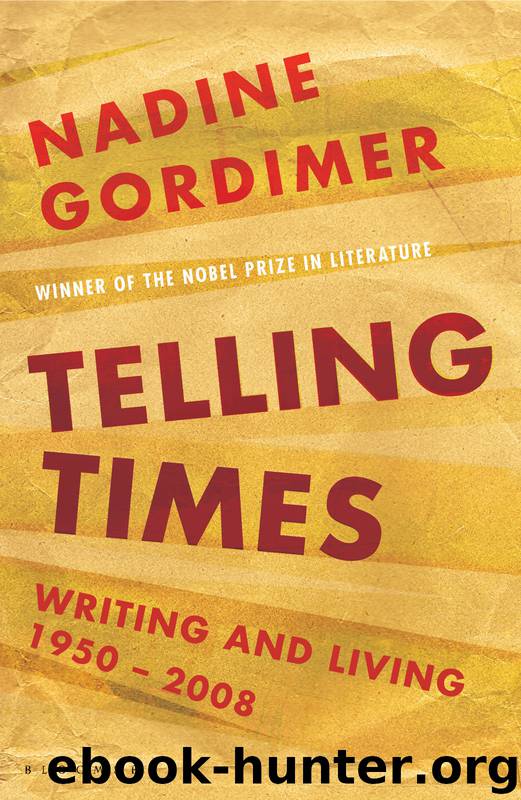Telling Times by Nadine Gordimer

Author:Nadine Gordimer [Gordimer, Nadine]
Language: eng
Format: epub
Publisher: Bloomsbury Publishing
Published: 2010-06-16T04:00:00+00:00
The Idea of Gardening
J. M. Coetzee’s The Life and Times of Michael K
Allegory is generally regarded as a superior literary form. It is thought to clear the reader’s lungs of the transient and fill them with a deep breath of transcendence. Man becomes Everyman (that bore).
From the writer’s point of view, allegory is no more than one among other forms. But I believe there is a distinction between the writer’s conscious choice of it, and its choice of him/her. In the first instance, loosened by time from ancient sources of myth, magic and morality, allegory is sometimes snatched from the air to bear aloft a pedestrian imagination or to distance the writer, for reasons of his own, from his subject. In the second instance, allegory is a discovered dimension, the emergence of a meaning not aimed for by the writer but present once the book is written.
J.M. Coetzee, a writer with an imagination that soars like a lark and sees from up there like an eagle, chose allegory for his first few novels. It seemed he did so out of a kind of opposing desire to hold himself clear of events and their daily, grubby, tragic consequences in which, like everyone else living in South Africa, he is up to the neck, and about which he had an inner compulsion to write. So here was allegory as a stately fastidiousness; or a state of shock. He seemed able to deal with the horror he saw written on the sun1 only – if brilliantly – if this were to be projected into another time and plane. His Waiting for the Barbarians was the North Pole to which the agitprop of agonised black writers (and some white ones hitching a lift to the bookshop on the armoured car) was the South Pole; a world to be dealt with lies in between. It is the life and times of Michael K, and Coetzee has taken it up now.
Michael K (the initial probably stands for Kotze or Koekemoer and has no reference, nor need it have, to Kafka) is not Everyman. In fact he is marked out, from birth, by a harelip indelibly described as curled like a snail’s foot. His mother is a servant in Cape Town, which means he is a so-called coloured, and he grows up fatherless in a home for handicapped children. His deformity distorts his speech and his actual and self-images. He shrinks from the difficulty of communication through words and the repugnance he sees holding him off, in people’s eyes; thus he appears to be, and perhaps is, retarded – one of those unclassifiable beings that fascinated Dostoevsky, a ‘simple man’. He is suitably employed as a gardener by the municipality of Cape Town. A civil war has been going on for an unspecified time – as such wars do, undeclared and unending – and in various parts of the country – as such wars are waged in our time, Michael K’s time – with roving destruction missing patches of stranded calm.
Download
This site does not store any files on its server. We only index and link to content provided by other sites. Please contact the content providers to delete copyright contents if any and email us, we'll remove relevant links or contents immediately.
The Rules Do Not Apply by Ariel Levy(4949)
Bluets by Maggie Nelson(4541)
Too Much and Not the Mood by Durga Chew-Bose(4324)
Pre-Suasion: A Revolutionary Way to Influence and Persuade by Robert Cialdini(4208)
The Motorcycle Diaries by Ernesto Che Guevara(4080)
Walking by Henry David Thoreau(3948)
Schaum's Quick Guide to Writing Great Short Stories by Margaret Lucke(3368)
What If This Were Enough? by Heather Havrilesky(3302)
The Daily Stoic by Holiday Ryan & Hanselman Stephen(3293)
The Day I Stopped Drinking Milk by Sudha Murty(3184)
The Social Psychology of Inequality by Unknown(3013)
Why I Write by George Orwell(2944)
Letters From a Stoic by Seneca(2788)
A Short History of Nearly Everything by Bryson Bill(2679)
A Burst of Light by Audre Lorde(2588)
Insomniac City by Bill Hayes(2537)
Feel Free by Zadie Smith(2473)
Upstream by Mary Oliver(2384)
Miami by Joan Didion(2363)
